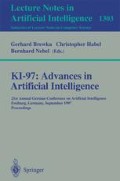Abstract
We specify a model for the conceptual interpretation of relative adjectives (like “big”), which covers a crucial aspect of the underlying comprehension process — the comparison to a norm that is associated with a comparison class. Building on an elaborate domain ontology and knowledge about intercorrelations, comparison classes are dynamically created depending on the context in which adjectival utterances occur.
Preview
Unable to display preview. Download preview PDF.
References
M. Bierwisch. The semantics of gradation. In M, Bierwisch and E. Lang, editors, Dimensional Adjectives, pages 71–261. Springer, 1989.
N. Bröker, S. Schacht, P. Neuhaus, and U. Hahn. Performanzorientiertes Parsing und Grammatik-Design: das ParseTalk-System. In C. Habel, S. Kanngießer, and G. Rickheit, editors, Perspektiven der Kognitiven Linguistik. Modelle und Methoden, pages 79–125. Westdeutscher Verlag, 1996.
C.G. Cech, E.J. Shoben, and M. Love. Multiple congruity effects in judgments of magnitude. Journal of Experimental Psychology: Learning, Memory, and Cognition, 16(6):1142–1152, 1990.
U. Hahn, K. Markert, and M. Strube. A conceptual reasoning approach to textual ellipsis. In Proc. of the ECAI-96, pages 572–576. J. Wiley, 1996.
U. Hahn and M. Romacker. Automatische Erzeugung von medizinischen Wissensbasen durch robustes, partielles Textverstehen: Befundtextanalyse im SYNDIKATE-System. KI — Künstliche Intelligenz, 11(3), 1997.
S. Kamei and K. Muraki. A discrete model of degree concept in natural language. In Proc. of the COLING-91, pages 775–781, 1994.
E. Klein, On formalizing the referential/ attributive distinction. Journal of Philosophical Logic, 8:333–337, 1979.
E. Klein. A semantics for positive and comparative adjectives. Linguistics & Philosophy, 4(1):1–45, 1980.
E. Klein. Comparatives. In A. von Stechow and D. Wunderlich, editors, Semantics, pages 674–691. W. de Gruyter, 1991.
A. Kyburg and M. Morreau. Vague utterances and context change. In Proc. of the 2nd Intern. Workshop on Computational Semantics, pages 135–155. Tilburg University, The Netherlands, 1997.
B.C. Malt and E.E. Smith. Correlated properties in natural categories. Journal of Verbal Learning and Verbal Behavior, 23(2):250–269, 1984.
K. McRae. Correlated properties in artifact and natural kind concepts. In Proc. of the 14th Annual Conf. of the Cognitive Science Society, pages 349–354, 1992.
L.J. Rips and W. Turnbull. How big is big? Relative and absolute properties in memory. Cognition, 8:145–174, 1980.
K.M. Sailor and E.J. Shoben. Effects of category membership on comparative judgment. Journal of Experimental Psychology: Learning, Memory, and Cognition, 19(6):1321–1327, 1993.
D. G. Schwartz. Outline of a naive semantics for reasoning with qualitative linguistic information. In Proc. of the IJCAI-89, pages 1068–1073, 1989.
G. Simmons. A tradeoff between compositionality and complexity in the semantics of dimensional adjectives. In Proc. of the EACL-93, pages 348–357, 1993.
S. Staab and U. Hahn. “Tall”, “good”, “high” — Compared to what? In Proc. of the IJCAI-97, 1997.
W. A. Woods and J. G. Schmolze. The KL-ONE family. Computers & Mathematics with Applications, 23(2-5):133–177, 1992.
L. A. Zadeh, PRUF — a meaning representation language for natural languages. International Journal of Man-Machine Studies, 10:395–460, 1978.
Author information
Authors and Affiliations
Editor information
Rights and permissions
Copyright information
© 1997 Springer-Verlag Berlin Heidelberg
About this paper
Cite this paper
Staab, S., Hahn, U. (1997). Conceptualizing Adjectives. In: Brewka, G., Habel, C., Nebel, B. (eds) KI-97: Advances in Artificial Intelligence. KI 1997. Lecture Notes in Computer Science, vol 1303. Springer, Berlin, Heidelberg. https://doi.org/10.1007/3540634932_21
Download citation
DOI: https://doi.org/10.1007/3540634932_21
Published:
Publisher Name: Springer, Berlin, Heidelberg
Print ISBN: 978-3-540-63493-5
Online ISBN: 978-3-540-69582-0
eBook Packages: Springer Book Archive

